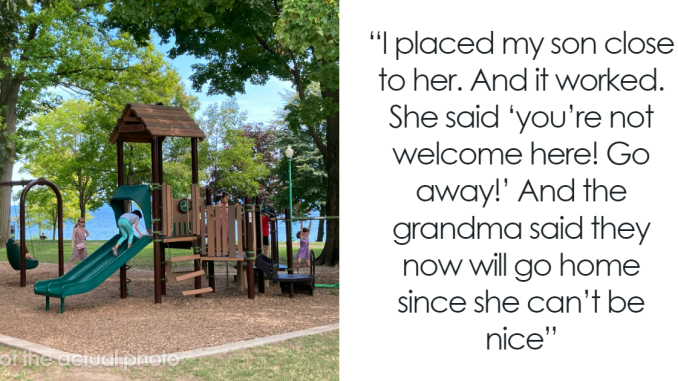
Parents usually do everything in their power to protect their kids, whether it’s keeping a watchful eye while they play or, occasionally, getting a bit creative in handling tricky situations.
One parent recently found themselves in just such a moment at the playground when a four-year-old with a bit of a mean streak crossed paths with their one-year-old son. The author explained online how they navigated the situation. Keep reading to know more details.
Parents can’t control the types of kids their children will meet at the park, but they can choose how to handle those interactions
Image credits: Oakville News (not the actual image)
A parent shared a clever playground story about handling a bratty child without directly intervening
Image credits: freepik (not the actual image)
Image credits: pastamarc
There are various styles of parenting, each with its unique approach to raising children
There are all kinds of parents out there, some who let their kids roam free and others who set firm rules. When it comes to parenting styles, there are four main types. The first ones are Authoritative parents. They are the ones who often strike a balance.
For instance, an authoritative mom or dad is someone who will set a curfew but also takes the time to explain why it’s important. Such kids often grow up feeling confident and secure because they have both structure and support. On the other hand, there are Authoritarian parents. They are often strict with little room for discussion. Picture the “my way or the highway” kind of parent. Their kids might follow the rules but can feel anxious or afraid to make mistakes.
Then there are uninvolved parents. They are the ones who aren’t able to give any time to their kids. It could be because they’re overwhelmed or distracted. These children often feel neglected, missing the guidance and attention they need.
Lastly, we have permissive parents, they are the ones who might let their kids eat ice cream for dinner occasionally. While this can foster creativity and independence, kids may also struggle with self-discipline later on.
“Being too permissive usually involves our bribing and pleading and often giving in. It means saying ‘No,’ but meaning ‘Probably not’ or ‘I’m not sure,’ which may feel loving in the moment but gives your child too much power,” says Nancy Samalin, author of “Loving Without Spoiling”.
If your kid is bullying others, parents should step in, address the behavior calmly, and teach empathy while setting clear boundaries for what’s acceptable
When kids feel like they always get their way, it can sometimes lead to spoiled or bratty behavior. Such children might resort to throwing tantrums when things don’t go according to them. Whether it’s in the middle of a grocery store or at home, they might kick, scream, and cry to get what they want, leaving parents in a tough spot.
It’s not just the loud outbursts, though. Spoiled kids can also get physical—hitting, grabbing, or even biting others if they feel frustrated or don’t like sharing. These behaviors can be overwhelming for parents to manage, especially in social settings.
And then there’s the constant whining. Whether it’s about not getting the snack they want or being told “no” for something small, spoiled kids often nag and complain endlessly, wearing down their parents with relentless demands.
When dealing with such behavior, parents should start with setting clear boundaries. Kids need to understand that they can’t always get what they want, and it’s okay if parents say “no” sometimes. When moms and dad are consistent with setting limits, they help kids learn about self-control.
Another thing that parents can try is teaching kids about empathy. Helping kids see how their actions affect others, like how hitting or whining makes people feel, can encourage them to behave more kindly.
Additionally, positive reinforcement can work wonders. Praising good behavior can show kids how they’ll get more attention and rewards for being considerate rather than demanding.
In this particular case, the child might have been acting a bit entitled. Have you ever had to set boundaries with a child who was acting bossy or demanding? What did you do? Tell us in the comments below.
People online praised the parent’s actions, sharing similar stories from their own experiences and even recalling incidents from their childhood
The post Man Gets A Girl In Trouble With Her Grandma On Purpose After She Bullied His 1YO Son first appeared on Bored Panda.
